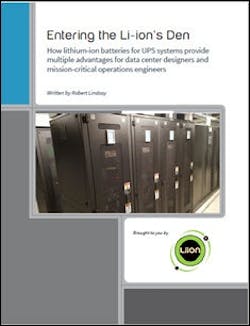How Lithium-ion Batteries for UPS Systems Provide Multiple Advantages for Data Center Designers and Mission-Critical Operations Engineers
Lithium-ion (li-ion) batteries have become an “invisible” but significant part of our everyday lives. In the past 10 years, lithium-ion batteries have been introduced as an energy storage solution for Uninterruptible Power Supplies (UPSs) in data centers and mission-critical facilities. The new report from Liion explores some of the benefits and arguments for lithium-ion batteries for UPS systems.
Many data center designers and operations engineers have been reluctant to utilize lithium-ion batteries. The purpose of UPS batteries is to ensure uptime and continuity of critical systems in the facility. In the event of a power outage, the batteries provide a quick high-power discharge to the UPS, to keep the facility operational during ride-through time. If the batteries fail, the UPS fails, and power goes down in the facility. Data centers are risk averse, and no one wants to take a chance on a new energy technology, without knowing how it will perform when it is needed.
But the technology behind lithium batteries has advanced to the point where they are far superior to lead acid batteries, in performance, practicality, and cost effectiveness.
This white paper, courtesy of LiiON, shows readers how utilizing lithium-ion batteries can help them to achieve key efficiency and resiliency goals for today’s data center design engineers and operations engineers.
